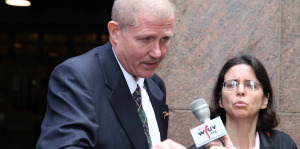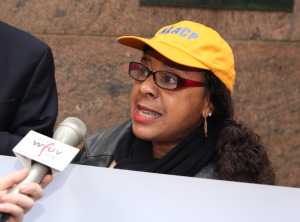A Westchester County housing opportunity commission gave the town of Harrison a goal of building 756 units of affordable housing by 2015 as part of a regional analysis of housing needs.
Since the commission filed its countywide Housing Allocation Plan in 1992, and revised it in 2005, Harrison has yet to build one affordable apartment.
Lena Anderson, president of the White Plains-Greenburgh NAACP, said it was time for the town “to allow the clock to move forward.”

“Harrison is sending the message to our lower-income citizens that they can come in and work in the big houses as nannies and servants, in the kitchens as cooks, in the gas stations and garages as mechanics, in the stores as clerks, in the schools as teachers, but at the end of the day they can”™t live there,” she said.
Anderson is part of a coalition of housing groups that is opposing the Metropolitan Transportation Authority”™s plan to sell 3.3-acre Harrison Metro-North train station parking lot to a developer, which will construct 143 rental apartments and 27,000-square-feet of ground-floor retail space.
The proposal, which was approved by the MTA board in September, is the first transit-oriented development project undertaken by the agency. But coalition members say the agency is allowing Harrison to perpetuate exclusionary zoning practices. Anderson and others spoke at a press conference Monday in front of Grand Central Terminal, calling on the MTA as a public agency to require that all transit-oriented development projects include at least 20 percent affordable and workforce housing units.
The town is one of 31 communities in the county named in a 2009 legal settlement with the federal government, in which Westchester agreed to build 750 units of affordable housing in its richest and statistically whitest communities. A September report by a monitor appointed to oversee implementation of the settlement named Harrison as one of six municipalities that have zoning practices contributing to a lack of integration of their black and Hispanic populations.
Harrison is one of several Westchester towns or villages that have not adopted a model zoning ordinance as recommended by the settlement, which would amend the town zoning to require at least 10 percent affordable units in any residential development.
The Workforce Housing Coalition was launched by regional fair housing group Community Innovations Inc. and its members include the local chapter of Habitat for Humanity, The Westchester Hispanic Coalition and the tenants”™ rights organization Mount Vernon United Tenants. Dennis Hanratty, of United Tenants, said inclusive zoning was necessary to combat income and racial inequality.
“The burden of building affordable housing has to be shared by other communities,” he said. Mount Vernon has a black population of more than 63 percent, according to U.S. census data, while Harrison”™s black residents made up slightly more than 2 percent of its overall population.
A recent study by Community Housing Innovations linked the lack of affordable housing units with a decrease in the percentage of 25- to 34-years-olds in the community. Harrison lost 20 percent of that demographic since the 2000 census and lost 34 percent from the census tract that includes the train station. That percentage dropped by more than half in the ZIP code that includes its elite hamlet Purchase, according to the report.

The market rate for the housing at the MTA Harrison site could be about $3,500 a month for a two-bedroom apartment, according to the coalition”™s estimates. Jim Killoran, executive director of Habitat for Humanity of Westchester, said that was not a realistic amount to pay for young educated singles or recently-married individuals in Westchester.
Killoran said the pro-housing advocates are often pegged as being anti-wealth but that pricing residents out of a community was “unintelligent” planning in the long term because it pushed out seniors and veterans. A lack of affordable units had a business effect, he said, because companies left the state as young, educated workers went elsewhere. “I want to end poverty and I have nothing against luxury apartments,” he said. “It”™s the most important time to rebuild New York.”
Alexander Roberts, executive director of Community Housing Innovations, questioned why the MTA included 475 parking spaces for train commuters as part of the Harrison plan but did not set allotments for workforce or affordable housing. He said the town not taking action was unfair to many of its neighboring municipalities, which have amended their zoning to encourage more multifamily construction.
“Harrison is clueless; it just doesn”™t get it,” Roberts said, though he said he generally favored the idea of transit-oriented development. “TOD alone isn”™t enough, it has to be equitable and it can”™t be done on (Harrison”™s) exclusive terms.”
The implementation of the 2009 affordable housing settlement has often raised the broader question of whether local towns, villages and cities or the county should dictate zoning and ensure demographic integration. Roberts said leadership from the county was “an economic necessity.”
“It is abundantly clear that affordable housing on any scale can”™t be built voluntarily,” he said.
An email seeking comment from the MTA was not returned by press time. The chosen developer for the project, Arlington, Va.-based AvalonBay Communities Inc., has built apartment buildings in Bronxville, Elmsford, Mamaroneck, New Rochelle, Ossining and White Plains. It operates a regional suburban office in Fairfield, Conn.
Harrison Mayor Ron Belmont, reached by phone, said he had no comment on the coalition or its press conference but said he continued to view the public-private partnership as the first step to “a downtown renaissance.”




















Comments 2